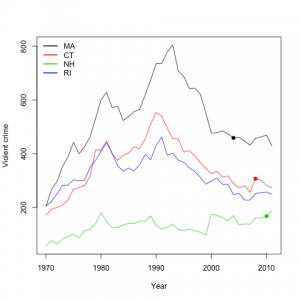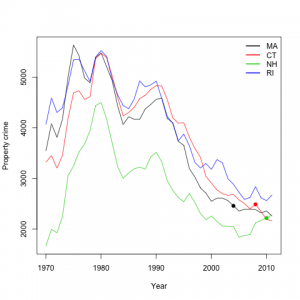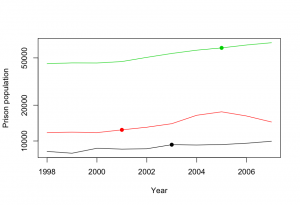Crime trends and marriage equality
[Update: according to today’s Herald, Mr McVicar wasn’t speaking for the Sensible Sentencing Trust. That wasn’t clear from yesterday’s story.]
The Sensible Sentencing Trust, rather surprisingly given their goals, seem to have a view on same-sex marriage. As Stuff reports
Sensible Sentencing Trust leader Garth McVicar has submitted to Parliament that changing the law to allow same-sex marriage will be yet another erosion of basic morals and values in society which have led to an escalation of child abuse, domestic violence, and an ever-increasing prison population.
The story also quotes someone who knows what they are talking about
Criminologist Dr James Oleson, from Auckland University, an expert in deviance, said he was not familiar with any research that would suggest homosexuals would be responsible for a disproportionate amount of crime.
I thought it would be entertaining to look at data from the US, where several states have introduced marriage equality over the past several years. I looked at states bordering Massachusetts, since it was the first, in 2004, Connecticut and New Hampshire followed a few years later. Here are graphs of crimes per 100,000 population for these three states and for Rhode Island, which does not yet allow same-sex marriage.
First, violent crime. The dot is the year that same-sex marriage started.
And property crime
See the upward trend after the dots? Me either.
For Europe it was harder to find crime data, but Mr McVicar mentioned “an ever-increasing prison population”, and I did find 1998-2007 prison populations for European Union countries. Here are the trends for the three that introduced same-sex marriage during that period: Netherlands (red), Belgium (black), and Spain (green). Again, the dots are when marriage equality started. Looking at this graph, the phrase “robustly null” comes to mind.
I don’t know why Mr McVicar thinks he and other New Zealanders will lose their moral fibre and become hardened criminals if the marriage equality bill passes, but it doesn’t seem to have happened in other countries.
Thomas Lumley (@tslumley) is Professor of Biostatistics at the University of Auckland. His research interests include semiparametric models, survey sampling, statistical computing, foundations of statistics, and whatever methodological problems his medical collaborators come up with. He also blogs at Biased and Inefficient See all posts by Thomas Lumley »



Really, all McVicar is doing is repeating the old “It were never like this in my day” and to be fair it weren’t.
But where he gets into trouble is that total crime has reduced by about 50% since the mid 90s.. both here and the US.. the Boomers are simply too old for burglary and fighting these days.
JC
12 years ago